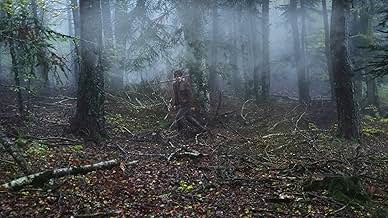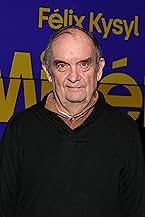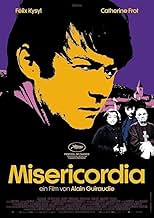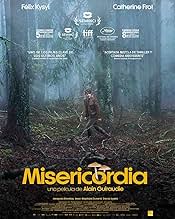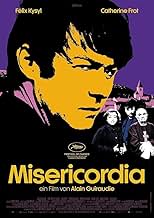Tornato per il funerale del suo ex datore di lavoro, la visita di Jérémie dalla vedova Martine si complica con una scomparsa, un vicino minaccioso e i loschi fini dell'abate.Tornato per il funerale del suo ex datore di lavoro, la visita di Jérémie dalla vedova Martine si complica con una scomparsa, un vicino minaccioso e i loschi fini dell'abate.Tornato per il funerale del suo ex datore di lavoro, la visita di Jérémie dalla vedova Martine si complica con una scomparsa, un vicino minaccioso e i loschi fini dell'abate.
- Premi
- 4 vittorie e 20 candidature totali
Luis Serrat
- Petit rôle
- (as Lluis Serrat)
Recensioni in evidenza
"Misericordia" is Latin for "mercy," and I gave the clever yet very narrowly contoured screenplay much of it. The performances were excellent, and the antagonist was easy enough to dislike, but there were too many unexplored backstories that needed to fold out; instead, the guesswork laid the story flat because most of the characters were thinly developed despite the available fodder for deep character studies.
The film is not without its philosophical musings on guilt and compassion for forgiveness, so Guiraudie had all the makings of a much greater film in hand.
I am fully aware that Misericordia was chosen for the best film of 2024 by Cahiers du cinéma and nominated for multiple César awards-but without this excellent cast ensemble and the outstanding cinematography, this film should have been a suspense short, not a feature.
The film is not without its philosophical musings on guilt and compassion for forgiveness, so Guiraudie had all the makings of a much greater film in hand.
I am fully aware that Misericordia was chosen for the best film of 2024 by Cahiers du cinéma and nominated for multiple César awards-but without this excellent cast ensemble and the outstanding cinematography, this film should have been a suspense short, not a feature.
Well, when there is death of a loved one, we don't want that to be a permanent loss. Each main character here carries a kind of loss with them. Human nature compels us to maintain hope; hope that there could be something more, eventually. Perhaps not a replacement of that person, exactly, but a kind of consolation. That's essentially what this movie is about, I feel, and each character searches for this consolation in their own, sometimes weird, ways. I can appreciate the humanity at work here.
Where the movie is lacking, for me, is Jeremy's backstory. Oddly, even though the movie is centred on Jeremy, we never really learn THAT much about him. On a practical level: how is he able to be unemployed for so long? On a deeper level: why is he doing what he is doing, exactly? Why is he behaving in this clingy way, never wanting to leave this house? Why did he love his former boss; how did that strong connection come to be? These questions are never really answered because there is little context/background here.
Also... do cops not need warrants in France? I'm no expert on the French legal system but it stretched believability for me that cops can just barge into a house like that, displaying no warrant, to interrogate Jeremy. Odd. But there are quite a few odd things in this odd little film. I don't necessarily mind that.
Where the movie is lacking, for me, is Jeremy's backstory. Oddly, even though the movie is centred on Jeremy, we never really learn THAT much about him. On a practical level: how is he able to be unemployed for so long? On a deeper level: why is he doing what he is doing, exactly? Why is he behaving in this clingy way, never wanting to leave this house? Why did he love his former boss; how did that strong connection come to be? These questions are never really answered because there is little context/background here.
Also... do cops not need warrants in France? I'm no expert on the French legal system but it stretched believability for me that cops can just barge into a house like that, displaying no warrant, to interrogate Jeremy. Odd. But there are quite a few odd things in this odd little film. I don't necessarily mind that.
The film's qualities are manifold. A script whose progression we never guess at, which keeps the viewer curious, imagining certain developments, some of which never come to pass. Subtle acting direction. Photography and sets that accentuate the drama. The absence of music, which lends permanent weight to all the images. The documentary element on mushrooms. Themes centered on the relationship between the characters: girlfriend, unrequited love, parent-child relationship, homoeroticism, but also humor bordering on parody and the ridiculous.
We understand that Guiraudie must admire Pier Paolo Pasolini's Théorème (1967), not for the universe, the bourgeoisie and the abstraction, but for the homoerotic possibilities. That said, we're not bored with Miséricorde.
Flaws: no empathy for the characters. We follow their evolution through the dramatic arc, but we're not concerned by what happens to them. The parish priest's dialogues at the end take the film away from naturalism and into the realm of the ridiculous or even Z-series, unless it's deliberate humor. But in the end, this is what makes the film so interesting: its constant navigation on the edge of the abyss of indecision and even ridicule, without falling into it.
We understand that Guiraudie must admire Pier Paolo Pasolini's Théorème (1967), not for the universe, the bourgeoisie and the abstraction, but for the homoerotic possibilities. That said, we're not bored with Miséricorde.
Flaws: no empathy for the characters. We follow their evolution through the dramatic arc, but we're not concerned by what happens to them. The parish priest's dialogues at the end take the film away from naturalism and into the realm of the ridiculous or even Z-series, unless it's deliberate humor. But in the end, this is what makes the film so interesting: its constant navigation on the edge of the abyss of indecision and even ridicule, without falling into it.
French film industry is very profilic and rather effective in terms of such countryside dramas, taking place in remote villages. Nothing to do with the urban life. Good atmosphere, anyway far more intersting than the story itself, where you wonder where it drives to. Unusual character symphony, far from clichés. I won't say any harm about this film, it is a small film for which the director have perhaps worked during many years. It's worth the watch for those in search of petty French dramas, rapidly forgotten dramas. They have their peculiarity, their charm. We can't deny it, can we? Except Catherine Frot, I don't know the cast. But this movie delivers something disturbing, against moral and right thinking. Not for all audiences.
It wasn't until after I saw Misericorida that I looked up and found out that the director, Alain Guiraudie, also directed Stranger by the Lake. That was a very good film, principally since in many ways it had a much more compact theme and storyline than Misericorida.
What I found muddled about the film was the introduction of Félix Kysyl as the protagonist Jérémie Pastor. He comes back to town for the funeral of his old boss, yet it's never made clear when and why he and his family lived in the town and why they left. And then there is the whole gayness of what is - or isn't - going on. Some times it's subtle, some times very overt, especially towards the end. And here again, it is confuse about whether Jérémie is or isn't gay. Finally, there is the whole matter of Jérémie's intention - or not - to stay in town after the funeral. Yet, this of course is the underlying tension in the film. Along the way there are some eye rolling plot elements that you just have to look past.
With all that, the story moves along being alternately suspenseful, humorous and even sad. Kysyl is great as the lead. Then there is Catherine Frot as Martine, the grieving widow, and Jacques Develay as the village priest who both give great performances. And the scenery is specatular, making you want to go to France to be in the stunning countryside.
Overall, a good film that is not by the numbers yet also is not without its flaws.
What I found muddled about the film was the introduction of Félix Kysyl as the protagonist Jérémie Pastor. He comes back to town for the funeral of his old boss, yet it's never made clear when and why he and his family lived in the town and why they left. And then there is the whole gayness of what is - or isn't - going on. Some times it's subtle, some times very overt, especially towards the end. And here again, it is confuse about whether Jérémie is or isn't gay. Finally, there is the whole matter of Jérémie's intention - or not - to stay in town after the funeral. Yet, this of course is the underlying tension in the film. Along the way there are some eye rolling plot elements that you just have to look past.
With all that, the story moves along being alternately suspenseful, humorous and even sad. Kysyl is great as the lead. Then there is Catherine Frot as Martine, the grieving widow, and Jacques Develay as the village priest who both give great performances. And the scenery is specatular, making you want to go to France to be in the stunning countryside.
Overall, a good film that is not by the numbers yet also is not without its flaws.
Lo sapevi?
- QuizPlaced at No1 in Cahiers du Cinéma's top 10 list for 2024.
I più visti
Accedi per valutare e creare un elenco di titoli salvati per ottenere consigli personalizzati
Dettagli
Botteghino
- Lordo Stati Uniti e Canada
- 181.451 USD
- Fine settimana di apertura Stati Uniti e Canada
- 23.405 USD
- 23 mar 2025
- Lordo in tutto il mondo
- 1.873.431 USD
- Tempo di esecuzione
- 1h 44min(104 min)
- Colore
- Mix di suoni
- Proporzioni
- 2.35 : 1
Contribuisci a questa pagina
Suggerisci una modifica o aggiungi i contenuti mancanti


